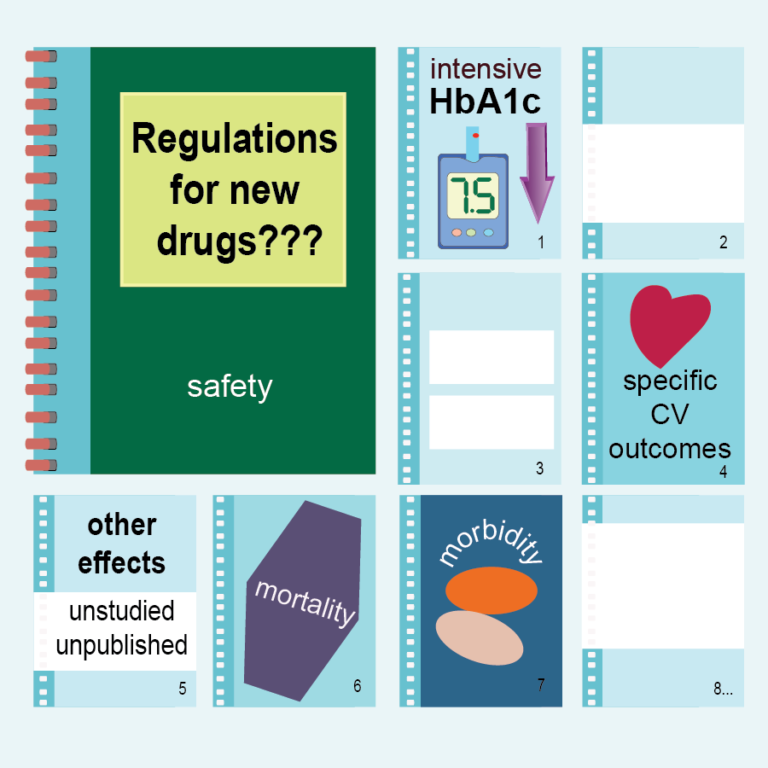Guest Post: 100th issue of the UBC Therapeutics Letter
 Questioning the basis of approval for non-insulin glucose lowering drugs
Questioning the basis of approval for non-insulin glucose lowering drugs
Over 213,000 British Columbians age 40 or older took glucose lowering drugs other than insulin during 2015. Of these, 44% took at least two drugs to lower blood sugar.
Treatment of type 2 diabetes should be aimed at preventing long-term complications such as heart attacks, strokes, kidney failure, blindness, amputations, and premature death. “Tight” glucose control, long part of the mantra of diabetes management, has not been proven to prevent these problems, although it is still widely practiced. Using drug therapy to control blood glucose to near normal values frequently causes symptomatic hypoglycaemia (low blood sugar), which can lead to falls, accidents, and in extreme cases to loss of consciousness.
“Governments are still approving new diabetes drugs purely on their ability to lower blood sugar, despite knowing this is not a reliable proxy for clinically important outcomes” said TI pharmacist Dr. Cait O’Sullivan. Dr. O’Sullivan recently attended a US FDA meeting convened to discuss alternative approaches to licensing, but found the FDA and drug industry emphasis remains on controlling blood glucose, rather than on the long-term impacts of treatment.
Dr. Jim Wright, Co Managing Director of the TI and Professor in UBC’s Department of Anaesthesiology, Pharmacology & Therapeutics points out that almost 50 years after research began into the long term treatment of type 2 diabetes, doctors still have little idea what their glucose-lowering treatments accomplish. “This condition is very different from type 1 diabetes, where insulin is life-saving. For type 2 diabetes, we know that some past treatments caused more harm than good, and we may still be causing a lot of unnecessary harm to patients – even with the best of intentions.”
According to Dr. Tom Perry, a general internist and clinical pharmacologist with the TI, clinical practice guidelines tend to lead clinicians into unwarranted comfort with current and new therapies: “We all want to help our patients, and it’s part of the history of medicine that we exaggerate how much good we are doing. Our massive emphasis on drugs may be leading us away from preventive approaches like regular physical exercise and dietary moderation that are more likely to benefit people long term.”
Upcoming UBC Therapeutics Initiative Events
If you happen to be in or around Vancouver this fall we would like to invite you to the upcoming Therapeutics Initiative course Bringing Best Evidence to Clinicians: Combining Evidence and Clinical Pharmacology to Improve Drug Therapy which is being held on Saturday, 29 October 2016 at Surrey Memorial Hospital, 13750 96 Avenue in Surrey, BC. Click here for more information about the course, including links to download the brochure and the registration form.
We also invite you to join us for the fall Therapeutics Initiative Journal Pub with special guests Dr. John Mandrola, Cardiac Electrophysiologist and Chief Cardiology Correspondent for Medscape, and Dr. Cait O'Sullivan, PharmD with the BC Provincial Academic Detailing Program. The TI Journal Pub is a fun social event in which Dr. Mandrola and Dr. O'Sullivan will make brief presentations on the topic: "Do we know what we're doing in cardiology and diabetes?" punctuated by lively discussion from the audience. The TI Journal Pub will be held on Thursday, October 27 at 6:00 pm at the Pacific Institute of Culinary Arts, 101 - 1505 West 2nd Avenue, Vancouver, BC (near the entrance to Granville Island, see map). You can read more and register on the Therapeutics Initiative website.
How are these letters developed?
Considerable research and collaborative work goes into developing the Therapeutics letters. The process involves a literature review and development of the message by different working groups of the Therapeutics Initiative. A draft of the letter is reviewed by specialists who are expert in the particular therapeutic area and members of the Scientific Information and Education Committee.
UBC Therapeutics Initiative

The Therapeutics Initiative was established in 1994 by the Department of Pharmacology and Therapeutics in cooperation with the Department of Family Practice at The University of British Columbia with its mission to provide pharmacists, physicians, nurses, and allied health professionals with up-to-date, evidence-based, practical information on drug therapy. Visit www.ti.ubc.ca or follow them on Twitter @Drug_Evidence to learn more.
- Guest Post, UBC, Therapeutics Letter


 Share
Share


